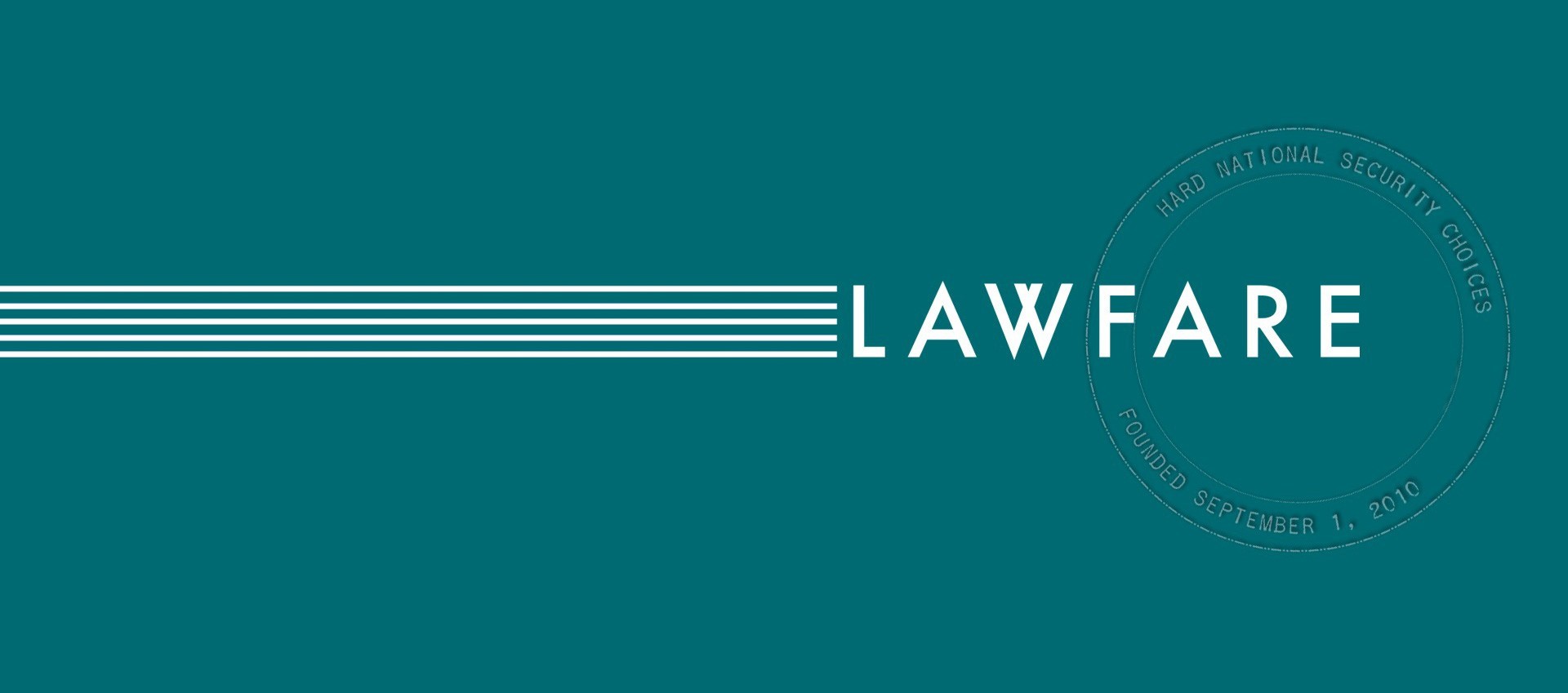The Week that Was: All of Lawfare in One Post
Our rundown of this week's activity on Lawfare.
Published by The Lawfare Institute
in Cooperation With

Oh, what a week it was! We were so crushed by the volume of news to keep up with that we haven't even gotten our poor readers their Guantanamo military commissions updates yet, leaving some of them bereft:
Hey @lawfareblog, important things are happening at Guantanamo. Why did you abandon us?
— Gitmo Watch (@GitmoWatch) February 20, 2016
Hang in there, @GitmoWatch. The cavalry is coming!
What were we covering this week? Well, the FBI fired a shot across the bow at Apple over its refusal to assist federal authorities in their efforts to unlock the iPhone of one of the San Bernardino shooters; we learned that the NSA doesn’t spy quite as much as some thought; the Times revealed that President Obama plotted cyberwar with Iran; Supreme Court Justice Antonin Scalia died. The DC Circuit heard oral arguments in a major national security case. Twitter has been hosting a lot of accounts of designated foreign terrorists. And we had the Triple Entente Beer Summit and a book soiree.
Here’s what we had to say regarding each of these matters.
Bobby initially alerted us to the news of the ongoing drama between the FBI and Apple in Califonia, noting that the encryption debate has now moved from Congress to the courtroom. In his piece, Bobby offered his analysis of Apple CEO Tim Cook’s statement regarding the magistrate judge’s order, in which he refused to ever build a “back door” to “the iPhone.”
Herb Lin later highlighted Apple’s response in a post of his own, calling Apple’s definition of a backdoor “unreasonable,” but also noting that he would prefer for legislative clarification on the issue, instead of having the outcome determined by what a magistrate judge determines to be appropriate.
Susan and Ben wrote on the brewing storm in the Central District of California between the FBI and Apple, examining the key legal issues at play and reminding readers that “Apple is selling you a phone, not civil liberties.”
Nick Weaver too got in on the Apple action, suggesting that the court order isn’t “a slippery slope, but a jump off the cliff.” Nick characterized this specific FBI’s request as “reasonable,” but termed the precedent it would set “catastrophic.” His reasoning? Primarily, that the court order would compel Apple to write a software program to go around several of the phone’s security features. In light of that, Andrew Woods asked whether the government can compel Apple to speak, arguing that “code is speech” and that “the constitutional issues in this case are not trivial.”
Ben later linked us to a discussion on KQED that he had with Laura Sydell and Nate Cardozo.
And yesterday, Loeb posted the government's latest brief in the case.
I directed reader attention to a newly released NSA Inspector General report that suggests the government receives far less data from Section 702 collection than critics originally suspected. That should be good news to privacy advocates in Europe. And speaking of Europe, Kenneth Propp wrote on the thawing U.S.-E.U. privacy relations in the context of the passage of the Judicial Redress Act.
But there is more work to be done, and Peter Margulies wrote on the clash in U.S. and E.U. approaches to terrorist sanctions.
Ben and Zoe Bedell took a look at tweeting terrorists. They asked whether it was illegal for Twitter to let terrorists operate accounts, and how Twitter would defend itself against a material support prosecution. J.M. Berger, who just completed a study on the battle between ISIS and Twitter, noted that while Twitter could do more, its suspension program is working to reduce the availability of ISIS propaganda.
In light of the New York Times’s story on “Nitro Zeus” --- an Obama administration blueprint for cyber war with Iran --- Herb Lin asked “what do we do in the aftermath of a planned cyberattack that is revealed?”
I shared this week's Lawfare Podcast, in which Daniel Placek discussed the hacker website Darkode.
I also shared a 28(j) letter filed in relation to CIA Director Gen. Michael Hayden's autobiography by the ACLU in its ongoing litigation against the CIA over the targeted killing program.
On Rational Security this week, it's the Triple Entente Beer Summit:
Susan shared Military Commissions Chief Prosecutor Mark Martins’ statement prior to the start of pre-trial hearings in the 9/11 military commissions case at Guantánamo Bay. As I noted above. We are behind in our summaries of the week's events at the commissions, but they're coming.
The D.C. Circuit also held hearings in Al Nashiri v. Obama. Robert Loeb suggested that the panel of judges “appeared to be leaning toward allowing the federal courts to address when hostilities began with al Qaeda.”
Scott Roehm responded to Gordon England's challenge of Ash Carter's Guantánamo transfers, taking issues with England’s characterization of the attendant risk of releasing or transferring detainees cleared by a Periodic Review Board.
Adam Klein reflected on Justice Scalia’s legacy and his rulings on national security cases. Later in the week, Steve Vladeck offered what he called “a more circumspect take on Justice Scalia and national security.” And last night, Ben linked to a piece he has written with Miguel Estrada on the politics of replacing Scalia.
Elina Saxena highlighted the national security related issues discussed in last week’s Democratic and Republican presidential debates.
Laura Dean looked at the social media documentation of the refugees fleeing Syria and noted the persistent anonymity that still shrouds many refugees.
Suzanne Maloney of Brookings wrote on the Americans that remain imprisoned in Iran, calling attention to the fact that neither Secretary of State John Kerry or President Obama has “bothered to mention the name of Siamak Namazi.”
Nadwa Dawsari wrote about lessons learned from counterterrorism in Yemen in this week's Foreign Policy Essay.
Samir Saran and Bedavyasa Mohanty took a look at cybersecurity in India.
And finally, Zack Bluestone covered China’s missile deployment in the South China Sea and the “uneventful U.S.-ASEAN Summit in this week’s Water Wars roundup.
And that was the week that was.





